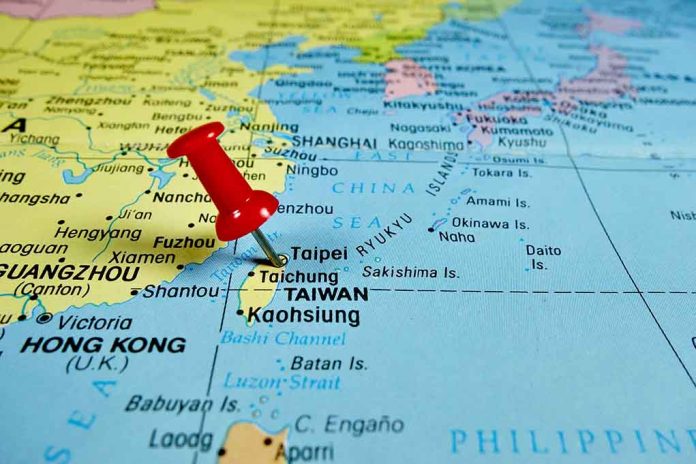🔴 Website 👉 https://u-s-news.com/
Telegram 👉 https://t.me/usnewscom_channel
Xi Jinping’s New Year declaration reignites concerns on Taiwan’s future, as it underlines China’s intent for unification amidst a backdrop of historical tension and global diplomatic challenges.
At a Glance
- Xi Jinping declares unification with Taiwan as unstoppable, citing historical ties.
- China intensifies military presence around Taiwan, raising global concerns.
- Taiwan’s autonomy remains a point of contention between China and the U.S.
- Military drills around Taiwan have surged to historic levels, simulating a blockade.
China’s Unyielding Stance
Xi Jinping’s New Year speech outlined a stark, unwavering perspective on Taiwan, proclaiming that “no one can stop” China’s reunification aims. He emphasized China’s historical and familial ties with Taiwan, a consistent narrative in Beijing’s rhetoric. While this concern isn’t new, the intensity and timing of Xi’s declaration signal escalating pressure on Taiwan amidst a broader international audience.
China’s pursuit of Taiwan unification is not limited to diplomatic language. Beijing has increased military pressure significantly, exemplified by mounting drills and heightened warship and aircraft presence around Taiwan. These actions, perceived as aggressive by Taiwan and its allies, add tension to an already fragile cross-strait relationship.
The Chinese government’s exercises reportedly reached historic scales, simulating military enforcement like blockades. This show of force suggests Beijing’s preparedness to use coercive measures should diplomatic efforts falter, further straining its relations with pro-Taiwan supporters globally.
Xi Jinping Pledges Reunification with Taiwan in New Year’s Message – USNI Newshttps://t.co/BOLHoZQPHw
— USNI News (@USNINews) January 1, 2024
International Repercussions
Taiwan remains a pivotal issue between China and the United States. While the U.S. does not officially recognize Taiwan, it remains its strategic ally and primary arms supplier. The evolving geopolitical struggle over Taiwan’s status prompts questions about future interactions between these superpowers and their global ramifications.
“Chinese people on both sides of the Taiwan Strait are one family. No one can sever our blood ties, and no one can stop the historical trend of the reunification of the motherland.” – Xi Jinping Source #1
Xi proposed a “one country, two systems” framework for Taiwan, promising to respect the region’s religious and legal freedoms. Despite presenting this as a harmonizing measure, it’s implausible to dismiss why it fails to reassure a Taiwanese population, overwhelmingly in favor of maintaining their democratic and autonomous status.
#FPWorld: Chinese President Xi Jinping delivered a stern New Year’s message on Tuesday, asserting that no force can stop China’s “reunification” with Taiwan.
Read more⬇️https://t.co/3AIIzK0r0l
— Firstpost (@firstpost) December 31, 2024
The Historical Context
The dispute over Taiwan dates back to the 1949 Chinese civil war, following which Taiwan has been governed independently. This schism influences current geopolitics, particularly as pro-independence sentiments intensify within Taiwan alongside its government’s pushback against foreign threats.
“The country is growing strong, the nation is rejuvenating and unification between the two sides of the strait is the great trend of history.” – Xi Jinping Source #2
As pressures mount from China, Taiwan’s government steadfastly defends its sovereignty and democratic status, led by the Democratic Progressive Party. The region’s persistence underscores its unique position in international discourse, where it stands as a beacon of democracy challenging an authoritative regime.
